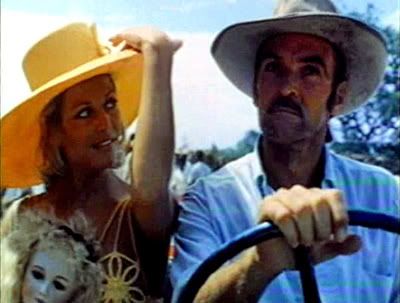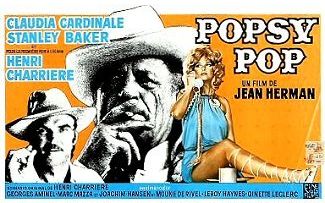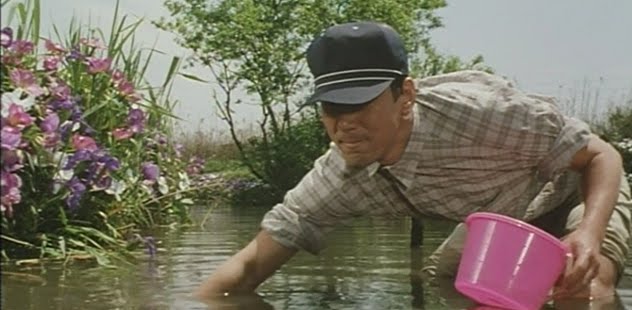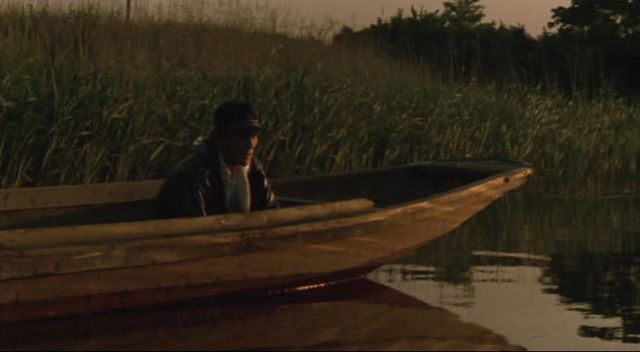From Monthly Film Bulletin, December 1974 (Vol. 41, No. 491). — J.R.

Popsy Pop (The 21 Carat Snatch)
France/Italy, 1970
Director: Jean Herman

Guiana. Plateau, Venezuela. In a ramshackle ‘boom town’, occupied by the natives who work the local diamond mine, the glamorous Popsy Pop arrives –ostensibly to divert the workers with her sexy cabaret act, but actually in order to distract Silva, the mine-company inspector, from a two-million-dollar diamond heist planned for the night of her arrival. Masterminded by Marcou, an ageing criminal who loves Popsy Pop, and carried out with the help of his henchmen Tormenta, Blanchette and Freddy -– who pilots the getaway helicopter — the robbery proceeds as planned: Silva is knocked unconscious in the singer’s dressing room and the diamonds are taken from the company office. But Popsv Pop and Freddy betray the rest of the gang by leaving without them. The angry workers kill Blanchette and Tormenta, but Silva persuades them to spare Marcou in the interests of recovering the diamonds — and offers the latter a cut of the reward in addition to a chance to avenge Popsy Pop’s double-cross. She has meanwhile taken a plane to Santa Domingo with Freddy, and places the diamonds in a safe deposit box, hiding the key in a jar of cold cream. Read more
These are expanded Chicago Reader capsules written for a 2003 collection edited by Steven Jay Schneider. I contributed 72 of these in all; here are the sixth dozen, in alphabetical order. — J.R.

Too Early, Too Late
This 1981 color documentary by Jean-Marie Straub and Danièle Huillet, one of their few works in 16-millimeter, is almost certainly my favorite landscape film. There are no “characters” in this 105-minute feature about places, yet paradoxically it’s the most densely populated work in their oeuvre to date. The first part shows a series of locations in contemporary France, accompanied by Huillet reading part of a letter Friedrich Engels wrote to Karl Kautsky describing the impoverished state of French peasants, and excerpts from the “Notebooks of Grievances” compiled in 1789 by the village mayors of those same locales in response to plans for further taxation. The especially fine second section, roughly twice as long, does the same thing with a more recent Marxist text by Mahmoud Hussein about Egyptian peasants’ resistance to English occupation prior to the “petit-bourgeois” revolution of Neguib in 1952. Both sections suggest that the peasants revolted too soon and succeeded too late. One of the film’s formal inspirations is Beethoven’s late quartets, and its slow rhythm is central to the experience it yields; what’s remarkable about Straub and Huillet’s beautiful long takes is how their rigorous attention to both sound and image seems to open up an entire universe, whether in front of a large urban factory or out on a country road. Read more
From the Chicago Reader (September 11, 1998). — J.R.

The Eel
Rating *** A must see
Directed by Shohei Imamura
Written by Motofumi Tomikawa, Daisuke Tengan, and Imamura
With Koji Yakusho, Misa Shimizu, Fujio Tsuneta, Mitsuko Baisho, Akira Emoto, and Sho Aikawa.
I’ve seen only five of Shohei Imamura’s 19 features, most of them so many years apart that it’s hard to see many stylistic or thematic connections. Yet there’s no doubt in my mind that his 18th, The Eel (1997) — which shared last year’s Palme d’Or with Taste of Cherry and opens this week at the Music Box — is the most interesting new movie around: funny, lyrical, provocative, imaginative, and consistently entertaining. That it happens to be Japanese is incidental to its interest, though I suppose a lot of people won’t go to see it because it isn’t in English. (I suspect the problem isn’t so much xenophobia as habit; most Americans have never seen a subtitled movie and probably regard the prospect of seeing one as work.)

It’s been a truism for quite some time that the Japanese cinema is in terrible shape, financially and aesthetically (particularly now that Akira Kurosawa has died) — though it’s not clear to what extent one should believe the overseas commentators who sift through the available evidence. Read more





